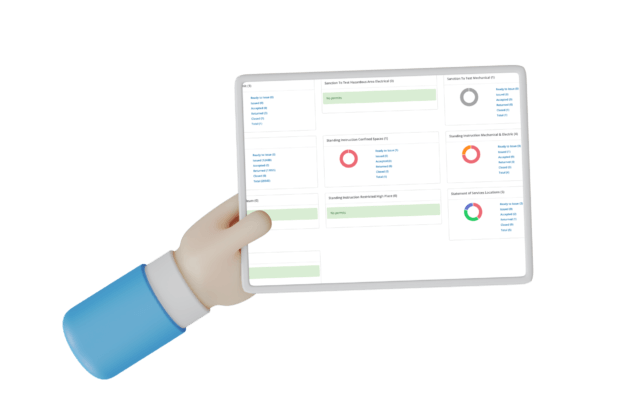- Why Verature?Find out why Verature is the best system for continuous contractor compliance.
- Arrive, Work & Stay Safe
- Removes Paper & Spreadsheets
- Tracks Key Contractors
- Instant 360 Visibility
- Contractor Management Dashboards
- Why Contractor Management Software
- Our Customer Reviews
- Pricing
We don’t hide behind fancy sales teams before we tell you, our prices.- Clients
See who we are working with and what they have to say about Verature.- Resources
Check out our blog, useful guides, whitepapers and product videos.- Prequalification and Induction Guide
- Contractor Compliance Guide
- Mini-Audit your Permit to Work System
- Health and Safety Audit Checklist
- Resource Library
- Blog
Book a demo
Verature’s Guide: Streamlining Contractor Management
The Critical Role of Contractor Management
In today’s dynamic business environment, effectively managing contractors is crucial for ensuring operational efficiency, compliance with legal and safety standards, and the successful completion of projects. Businesses increasingly rely on contractors to provide specialised skills, support during peak periods, and contribute to strategic projects. This reliance makes it essential to have robust processes in place for selecting, managing, and evaluating contractors, ensuring they meet the organisation’s standards for quality, safety, and performance. Managing contractors effectively not only mitigates risks but also maximises the value they bring to the organisation.
Legal Framework and Contractor Management
The Importance of Legal Compliance
Understanding the legal obligations involved in contractor management is vital for any organisation. This section delves into the complex legal framework that governs the engagement of contractors, highlighting the necessity for businesses to stay compliant with current laws and regulations. As legislation evolves, it’s imperative for organisations to remain updated on changes that may affect their contractor management processes.
Navigating Legal Updates
The legal landscape surrounding contractor management can vary significantly from one jurisdiction to another and may involve updates since earlier references. It’s crucial for businesses to be aware of these developments to ensure their practices are not only compliant but also reflective of the latest legal standards. This proactive approach helps in mitigating risks associated with non-compliance and enhances the organisation’s reputation for due diligence and responsibility.
By staying informed about legal requirements and adapting to changes, organisations can create a robust framework for managing contractors that safeguards all parties’ interests and upholds the highest standards of safety and quality.
Understanding ‘Duty of Care’
The Essence of Duty of Care
‘Duty of Care’ is a fundamental concept that obligates organisations to ensure the health, safety, and well-being of their employees and contractors. It becomes applicable when an organisation engages contractors, requiring the implementation of measures to prevent harm.
Breach and Its Implications
A breach occurs when these measures are inadequate or fail, potentially leading to legal, financial, and reputational consequences for the organisation. Understanding and effectively managing this duty is crucial to mitigate risks and safeguard all parties involved.
Legal Framework and HSE Guidelines
Complying with Legal Obligations
Organisations must navigate a complex legal framework that dictates their obligations towards contractors. This includes adhering to specific health and safety regulations and guidelines provided by the Health & Safety Executive (HSE).
HSE’s Advice for Managing Contractors
The HSE offers comprehensive advice on managing contractors, emphasising planning, competency assessment, and ongoing monitoring to ensure compliance and promote a safe working environment. Keeping abreast of these guidelines is essential for maintaining legal compliance and enhancing workplace safety.
Strategic Planning for Contractor Engagement
The Foundation of Contractor Management
Effective contractor management begins with strategic planning. This critical first step involves identifying project needs, defining the scope of work, and understanding the specific skills required. Planning sets the stage for a successful contractor engagement process, ensuring that the right resources are aligned with project goals and timelines. By meticulously planning, organisations can better manage risks, set clear expectations, and establish a solid framework for contractor performance and compliance.
Criteria for Choosing the Right Contractor
Due Diligence in Selection
Selecting the right contractor is pivotal to project success. This process should be guided by thorough due diligence and competency assessment. Organisations must evaluate potential contractors based on their qualifications, experience, safety records, and ability to meet project requirements. Emphasising these criteria helps in choosing a contractor who not only fits the project’s technical needs but also aligns with the company’s values and safety culture. This careful selection process mitigates risks and lays the groundwork for a productive working relationship.
Integrating Contractor Management Systems
Enhancing Efficiency with Technology
The integration of contractor management systems like Verature into an organisation’s operations can significantly streamline the process of managing contractors. These systems offer a centralised platform for tracking contractor qualifications, compliance documents, and performance metrics. By automating and centralising data, such platforms facilitate improved communication, better risk management, and more efficient contractor oversight. The benefits of implementing a contractor management system include enhanced compliance tracking, time savings, and improved contractor performance visibility, making it an essential tool for modern businesses.
Operational Excellence: Contractors On-Site
Ensuring Safety and Compliance
The management of contractors working on-site is critical for maintaining operational excellence. This involves rigorous safety protocols, clear communication of expectations, and close supervision to ensure compliance with project specifications and regulatory standards. Effective on-site management helps in identifying and mitigating potential risks, ensuring that contractors adhere to safety guidelines and project timelines, which are essential for the smooth execution of tasks.
Monitoring and Performance Evaluation
Tracking Success and Areas for Improvement
Monitoring the contract and evaluating contractor performance are ongoing processes that provide insights into both successes and areas needing improvement. Regular performance reviews, feedback sessions, and compliance checks ensure that objectives are being met and standards are maintained. This systematic approach allows for timely interventions if issues arise, ensuring project goals are achieved efficiently.
Post-Completion Review and Continuous Improvement
Learning and Evolving for Future Success
After project completion, conducting a thorough review of the work performed by contractors is crucial for identifying lessons learned and areas for continuous improvement. This post-completion analysis not only assesses the fulfilment of project objectives but also enhances future contractor engagements by applying the insights gained. Emphasising continuous improvement strengthens the contractor management process, contributing to better outcomes in future projects.
Conclusion: Empowering Contractor Management with Verature
In the modern business landscape, managing contractors with efficiency, compliance, and safety at the forefront has never been more crucial. Verature offers a comprehensive solution that simplifies these challenges, providing an all-in-one platform for contractor management. With features designed to enhance visibility, streamline processes, and ensure compliance, Verature empowers organisations to focus on operational excellence and strategic growth.
Embrace the future of contractor management and discover how Verature can transform your approach. For a detailed exploration of how Verature can benefit your organisation, consider booking a demo at Verature. Take the first step towards optimising your contractor management process and ensuring your projects’ success with Verature’s innovative solutions.
Book a demoFind out if you’re ready with our Verature Onboarding Kit
Not sure if Verature is right for you? We understand it’s not easy to make a decision on a new system, but that’s why we’ve created our Onboarding Kit to make that that process simple.
Check our package details
Find out no matter what package you choose, you’ll be getting the best features you need for you and your team so you can have continuous contractor compliance.
Make it your own
You’ll get to see and choose your customisation options, and check out the available add-ons and extras so the system is exactly what you want and need.
Quickly getting you started.
Keeping this guide with you, and working closely with us, we can walk you through each step so you can be completely up and running with your own Verature system.
More reasons to use Verature
It’s easy to get started.
Step 1
Book a demo of Verature with the team.
Step 2
We’ll chat through your requirements and see if Verature is right for you.
Step 3
We’ll send you demo access and our onboarding kit to help you decide what you need.
Step 4
You decide if we’re right for you. No pushy sales calls.
Step 5
Like what you see and hear? Let’s get you onboarded with Verature!









